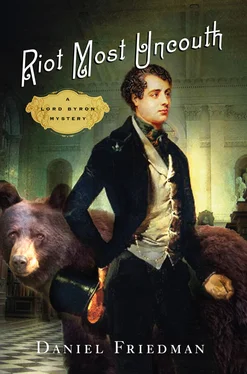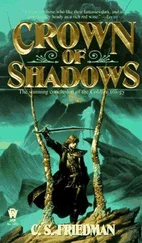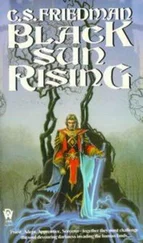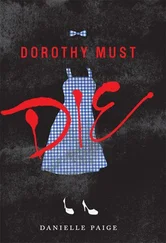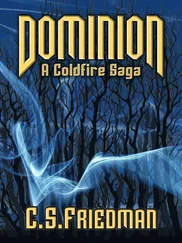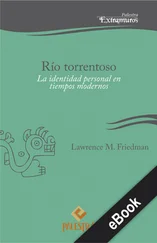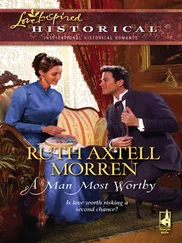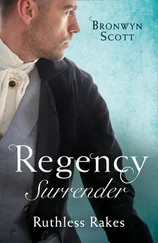Daniel Friedman - Riot Most Uncouth
Здесь есть возможность читать онлайн «Daniel Friedman - Riot Most Uncouth» весь текст электронной книги совершенно бесплатно (целиком полную версию без сокращений). В некоторых случаях можно слушать аудио, скачать через торрент в формате fb2 и присутствует краткое содержание. Год выпуска: 0101, ISBN: 0101, Издательство: St. Martin, Жанр: Исторический детектив, на английском языке. Описание произведения, (предисловие) а так же отзывы посетителей доступны на портале библиотеки ЛибКат.
- Название:Riot Most Uncouth
- Автор:
- Издательство:St. Martin
- Жанр:
- Год:0101
- ISBN:9781250027580
- Рейтинг книги:5 / 5. Голосов: 1
-
Избранное:Добавить в избранное
- Отзывы:
-
Ваша оценка:
- 100
- 1
- 2
- 3
- 4
- 5
Riot Most Uncouth: краткое содержание, описание и аннотация
Предлагаем к чтению аннотацию, описание, краткое содержание или предисловие (зависит от того, что написал сам автор книги «Riot Most Uncouth»). Если вы не нашли необходимую информацию о книге — напишите в комментариях, мы постараемся отыскать её.
Riot Most Uncouth — читать онлайн бесплатно полную книгу (весь текст) целиком
Ниже представлен текст книги, разбитый по страницам. Система сохранения места последней прочитанной страницы, позволяет с удобством читать онлайн бесплатно книгу «Riot Most Uncouth», без необходимости каждый раз заново искать на чём Вы остановились. Поставьте закладку, и сможете в любой момент перейти на страницу, на которой закончили чтение.
Интервал:
Закладка:
And Whippleby knew there was something wrong with the story; he always had. “I’ve never been satisfied with your explanation of the events in Cambridge, nor am I satisfied with the man you delivered up as the murderer,” he said. “Even though I’ve been unable to prove you’re a liar, you are a detestable man and I would like to see you dancing upon the air with a rope around your neck.”
I let the insults pass without comment; I knew what had happened to my reputation. My fortunes were in such disarray that I had been forced to sell Newstead to stave off my creditors. The acrimonious dissolution of my brief marriage had left my reputation a shambles. People of all social classes gossiped openly about my affairs with chorus girls and spread the slanderous rumor that I had committed incest with my half sister, Augusta Leigh. This pained me greatly, for Augusta was my only living connection to my father.
“Your own hired man told you the same story,” I said.
“The supposed perpetrator that you and that investigator accused was utterly ordinary; of so little consequence that his death brought me no catharsis or satisfaction. And yet, for years, you’ve been speaking in public of goblins and ghouls, and the involvement of mystical and supernatural elements in the Cambridge murders. How can you claim that mundane and fantastic explanations for my daughter’s murder are simultaneously true? At least one of your stories must be a lie, and if one of them is, then the other might be as well.”
My natural instinct was to be evasive about this subject, yet it seemed atrocious to lie to this bereaved old man. And why was I writing about the Cambridge murders, if not to finally tell the truth about them? I had no interest in continuing to preserve secrets that belonged to the dead.
In light of my own financial ruin and public shame, I was preparing to flee permanently to the Continent, to Switzerland, perhaps, and then to Italy or Greece. Or perhaps I’d go to the East; to Greece, to Turkey, to Rumania, to Transylvania. I was not ashamed; I have never been ashamed. But I was leaving. I had no desire to live anymore among people with the audacity to question my moral character.
With no esteem or fortune left to risk, I was free to leave behind an unvarnished account of the truth about the Cambridge murders, a final volley of ordnance to blast the legs off my enemies and assure that, in my absence, England would not forget me. I had nothing to gain by lying anymore, and nothing to lose by telling the truth.
“During the brief period of my childhood in which I knew my father, he spoke often of the vampires he’d encountered in the East,” I said. “I first involved myself with the murders in Cambridge because the killer’s method of draining blood from his victims reminded me of those stories.”
Whippleby’s expression softened. “Yes, your father abandoned you when you were a small boy and died soon after, in France.”
“It seems you know a lot about me, Lord Whippleby.”
“You are inextricable from the events in Cambridge, which have, for years, preoccupied me. Yes. I know much about you. I have followed your antics; your rise to fame and your inevitable public shaming. I have studied your poetry. But I have never heard or read anything to suggest that your father was an important piece of the Cambridge puzzle. He left England years prior, did he not?”
“Even famous knaves are discreet about some things,” I said, though I supposed I was done with discretion. “The deepest wounds are the ones we conceal.”
“We are both preoccupied, then. We both grieve,” he said. “A son grieves for a father, and a father grieves for a daughter. But my daughter and your father have nothing to do with one another.”
“There are things I know and there are things I believe,” I said. “Some of the things I know are things I cannot let myself believe, and some of the things I believe are difficult to reconcile with facts. This, I think, is a common human conundrum.”
“You speak of God.”
“No, I’m talking about Mad Jack. And about vampires.”
“John Byron Gordon is dead.”
“I know that,” I said, “but I don’t believe it. He cannot be dead. I’m not finished with him yet.” Death was only for the poor and the foolish, Mad Jack said. And Mad Jack was no fool.
Whippleby licked his fingertip and contemplatively stroked it across his mustache. “They say both of us are insane, and perhaps they’re right.”
“A woman I once loved will proclaim to all who will listen that I am mad and bad and dangerous to know. I’ve also heard that I am a drunk and an addict and a sexual deviant. But madness and drunkenness seem to me the only reasonable responses to the desperate reality of the human condition. How else can one dull the pain of past sorrows and quiet the howling inevitability of future grief?”
When Whippleby spoke again, his voice was softer and gentler. His hands unclenched a little. After so many years of hatred, this man would never forgive me, but perhaps we had found a common cause. “If you truly mean to write a full account of the Cambridge murders, you must find out who hired the second private constable. This question has become, for me, an obsession. Both Fielding Dingle and Archibald Knifing claimed to have come to Cambridge on my behalf to catch my daughter’s killer. But I swear on Felicity’s grave that I hired only one man.”
He waited for me to speak. When I did not, he resumed.
“People have, in the past, suggested that I gave duplicate instructions to two servants, and thus, through my agents, I hired both men inadvertently. For a time, I believed this myself. I was near delirious with grief in the hours and days after I learned of my daughter’s death. But I could account for only one servant who had been dispatched on such a task. I consulted my bankers, and only one disbursement was made to compensate an investigator. One of those two men went to Cambridge at my behest. The second went there under false pretenses. The trouble is that I do not know which man I hired.”
“Why don’t you simply ask your servant whom he retained?” I said.
“He was killed only a few days after Felicity died, before I learned that a second investigator had gone to Cambridge, masquerading as my agent,” Whippleby said. “My man was knocked down in the street by a speeding stagecoach. The driver was never identified, and I have come to believe my servant’s death was not an accident.”
“Does your bank not keep records?” I asked. “Can they not tell you who drew funds on your note?”
He shook his head, and a visible cloud of dust shook loose from his hair and danced in the dim sunlight streaming through his dirty window. The old man’s skin was pale as milk, and blue veins rolled beneath the translucent surfaces of his neck as he spoke. Whippleby probably had not been outside in months. “My servant paid cash, so the bank could offer no assistance. I made inquiries into the backgrounds of both thief-catchers. Fielding Dingle was, at least, legitimate, known among the fraternity of professional investigators and respected for his doggedness, if not for his intellect. Knifing, of course, was among the profession’s greatest lights. He was a war hero and a personal friend of the King. His reputation was said to be unimpeachable, though I’d call that an overstatement.”
Whippleby paused to pour himself a glass of warm, cloudy gin from a bottle with a crystal stopper. He didn’t offer me any, but I took no offense. His stuff smelled like pine sap, and I had a flask of a finer spirit in my waistcoat pocket. I unscrewed the cap and indulged. It seemed rude to let Whippleby drink alone.
“Deceit and disreputability are the thieftaker’s apprenticeship. These men are former spies and criminals, ostensibly reformed, but turned to a task only marginally more respectable. I told my man to find me the best one I could afford. I’d think, with my resources, I could have hired a better man than Dingle, but I doubt my coin was sufficient to employ someone of Knifing’s eminence, unless he agreed to lower his rate for some reason. In any case, only one of the two went to Cambridge at my urging. The second was acting on behalf of other interests. Of this, I am certain, and for this reason, I have never been able to accept the claim that the killer was some deranged peasant of no particular consequence. Someone must have hired the second man. Something has been covered up, and if you mean to lay down a true account of these events, you must unravel that mystery. I’ve failed in all my attempts, but perhaps you will succeed where I could not.”
Читать дальшеИнтервал:
Закладка:
Похожие книги на «Riot Most Uncouth»
Представляем Вашему вниманию похожие книги на «Riot Most Uncouth» списком для выбора. Мы отобрали схожую по названию и смыслу литературу в надежде предоставить читателям больше вариантов отыскать новые, интересные, ещё непрочитанные произведения.
Обсуждение, отзывы о книге «Riot Most Uncouth» и просто собственные мнения читателей. Оставьте ваши комментарии, напишите, что Вы думаете о произведении, его смысле или главных героях. Укажите что конкретно понравилось, а что нет, и почему Вы так считаете.
